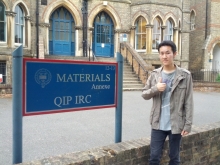
University:
Major:
Site Abroad:
Mentor(s):
Faculty Sponsor(s):
Faculty Sponsor's Department:
Project Title:
Project Description:
Since their discovery in 1985, fullerenes have played a large role in the study of carbon nanomaterials. Endohedreal metallofullerenes (EMFs), fullerenes with metal atoms trapped within their carbon cages, have been suggested as good candidates for the role of a qubit, the basic unit of a quantum computer, due to the non-reactivity as well as the usable spin of the caged metal atom. To determine the viability of EMFs as candidates for quantum computing applications, studies to maximize the yield and purity of Yttrium EMFs (Y@C82) were carried out. Y@C82 was synthesized through the Arc Discharge method, extracted through a Soxhlet extractor, and purified using High Performance Liquid Chromatography (HPLC). Parameters of the Arc Discharge, including helium pressure and arc current, were varied to determine their effects on the overall yield of Y@C82. The dynamics of the Soxhlet extraction of Y@C82 were studied to determine the time in which the maximal amount of Y@C82 was able to be extracted. A new purification technique involving the selective complexion and precipitation of Y@C82 with Lewis acids, specifically titanium (IV) chloride, was studied as a possible replacement to the current time consuming purification method of HPLC. Overall the variation of parameters did indeed show an effect on the overall yield of Y@C82 and an optimal extraction time was determined for Y@C82. Y@C82 did indeed complex selectively with titanium (IV) chloride, however further studies must be completed before this process can be a viable replacement for the current HPLC process.
